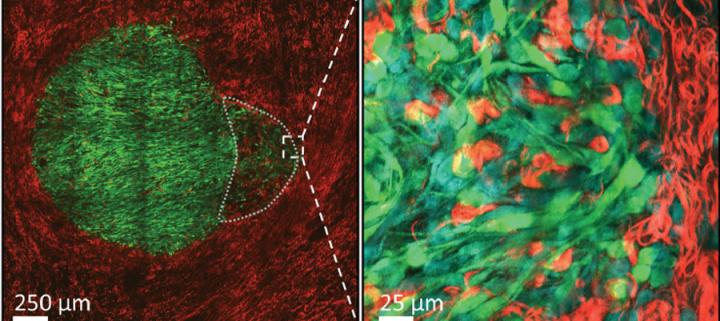Academic impact
From great ideas to scientific breakthroughs and new technologies.

Cancer Research UK Edinburgh Centre has a very profound impact on the academic community in the UK and internationally. This impact is achieved mainly through scientific publications, training of next generation scientists and clinicians, and technology development. The Centre also organises meetings, seminars and workshops for laboratory personnel, NHS practitioners and other professionals directly contributing to improved standards and operating procedures in a broad spectrum of institutions across UK (including NHS). Cancer Research UK Edinburgh Centre provides biomedical research and career training for over 30 PhD students with some PhD positions specifically aimed for cancer clinicians. A good example of the Centre’s educational activities is its contribution to the unique Molecular Pathology Programme initiated recently by the University of Edinburgh in collaboration with University of St Andrews, with support from the Medical Research Council. Many lectures/seminars within the programme are provided by Cancer Research UK Edinburgh Centre investigators and significant proportion of lab-based activities are performed in the Centre. The programme trains a new generation of molecular pathologists capable of handling modern genome-analysis-aided approaches to diagnosis and treatment of human disease (including cancer) and will result in a number of top level professionals who will subsequently apply their knowledge and skills in NHS hospitals and academic institutions across the country. The Centre investigators publish multiple original-research, review and “point-of-view” articles every year, most of them in well-established international journals with broad academic audiences including basic scientists, engineers, translational scientists, clinical academics and practitioners in a broad spectrum of scientific disciplines, from physics and bioinformatics through basic cell biology to applied clinical sciences. Within the past five years our researchers contributed to over 20 publications in top scientific/clinical journals “Nature”, “Cell”, “Science”, “Lancet” and “New England Journal of Medicine”. The Centre investigators put special emphasis on open-access publishing, enabling easy and free-of-charge access to our published research for interested members of general public. The Centre scientists are also at the leading edge of technology development in multiple research areas. Examples include generation of the first genetically encoded "continuously red-photoactivatable green" two-colour probe for live cell imaging (Welman et al. J Biol Chem. 2010; 285:11607-16), developing advanced intra-vital cancer imaging techniques (e.g. Lee et al. IntraVital. 2015;4: e1055430) and pioneering bioorthogonally activated prodrug approaches to improve the efficacy and safety of cancer treatments (Weiss et al. Nat Commun. 2014;5: 3277). Cancer Research UK Edinburgh Centre is also playing a leading role in application of Reverse Phase Protein Arrays and Phenotypic Screening technologies in cancer research and drug development. For example our researchers were among the funding members of the European Cell-based Assays Interest Group and the National Phenotypic Screening Centre. Our advances in technology development impact other academics both via technology transfer and by enabling them access to our know-how and facilities (e.g. in a form of collaborative research).

